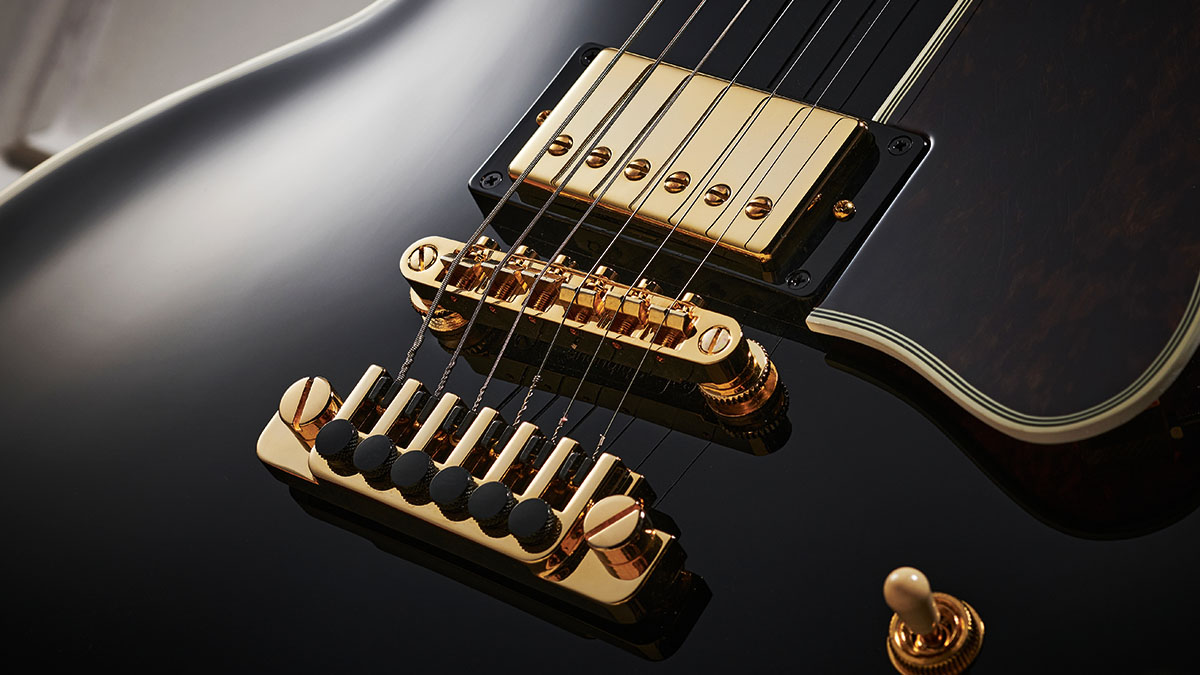MusicRadar Verdict
Epiphone’s take on the most-famous blues guitar in history puts that class and old-school suite of tones within reach of a wider demographic, and if they’ve still got the blues this is the instrument to chase them away.
Pros
- +
Beautifully realised blues guitar in a tux.
- +
Wide range of tones for blues or jazz.
- +
Quality build and finish.
- +
Good value.
Cons
- -
Varitone and dual outputs might be to everyone's taste.
- -
It's heavy.
MusicRadar's got your back
Epiphone BB King Lucille: What is it?
There were many Lucilles in the life of BB King. Once an electric guitar met his approval, typically a Gibson ES-355 semi-hollow, they were named and welcomed into the family. We can’t say what he would think of this Epiphone but it sure looks fit for a King.
This Lucille is another fascinating Epiphone signature guitar, with a grown-up spec for the price, and looks. And best of all if could be yours. There is of course a voice at the back of your head, a little intimidation from the prospect of playing up a guitar bearing BB King’s name and then applying our own earthly chops to the blues box. But this is a very attractive instrument, with no shortage of come hithers.
There are many signature details. As per King’s preference, and to stop feedback, there are no F-holes on the laminated maple and poplar body. Similarly, there’s a solid centre block of maple to nix unwanted squealing. The bridge and tailpiece are bespoke, too, with the Epiphone LockTone tune-o-matic bridge complemented by a TP-6 fine-tuning tailpiece, a reminder also that King’s playing always had the most on-point intonation.
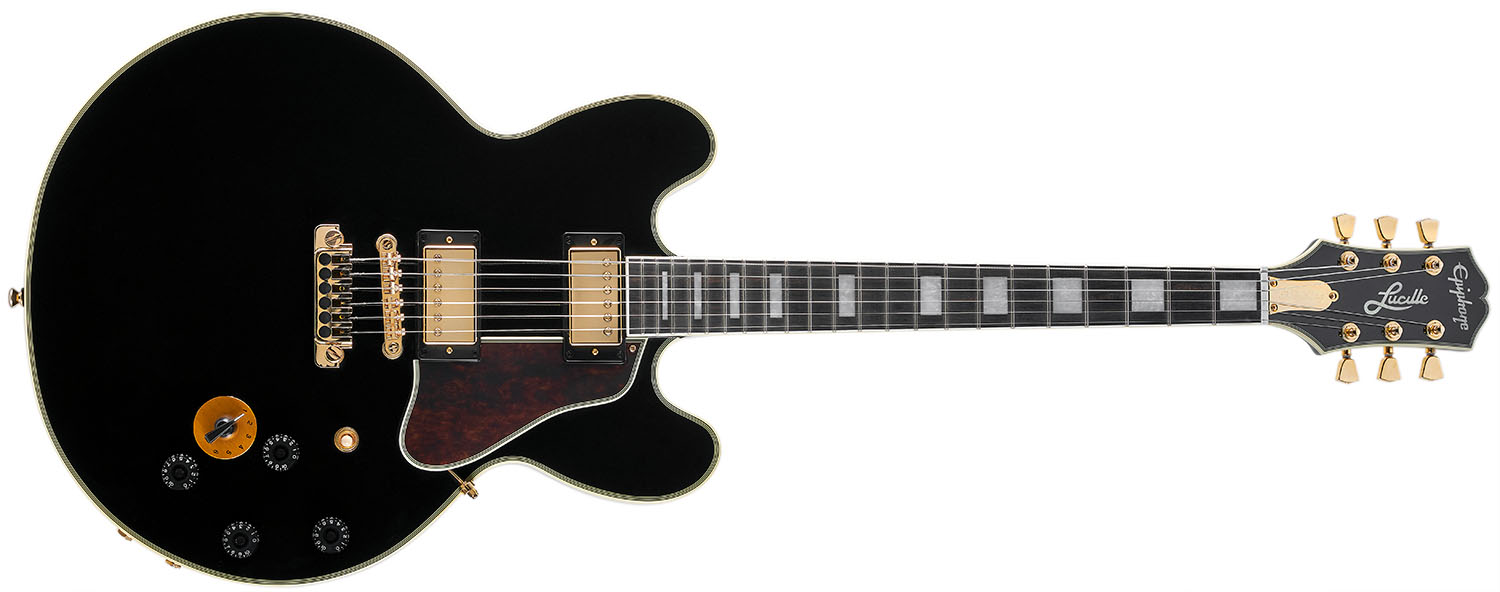
The deep black ebony finish is a gloss you’re going to want to buff out before returning Lucille to its EpiLite case, and it is complemented by multi-ply binding on the body, fingerboard and headstock, the gold hardware reprised on a signature-bearing brass truss rod cover. There’s binding on the five-ply ES-335-style tortoise pickguard, too, and those block inlays on the ebony fingerboard complete the look. This is one put together guitar.
It’s also quite a beast. Weighing in at just over 9lbs, there’s plenty to hold onto. There’s a sense that this helps make the Epiphone Lucille a great blues guitar, wrestling the notes out of a bear, throttling it, bending those strings till it hurts. That’s the idea... Though taking that maple neck in hand, the rounded C profile is a sure tell that this is all about fretting hand comfort. More on this shortly.
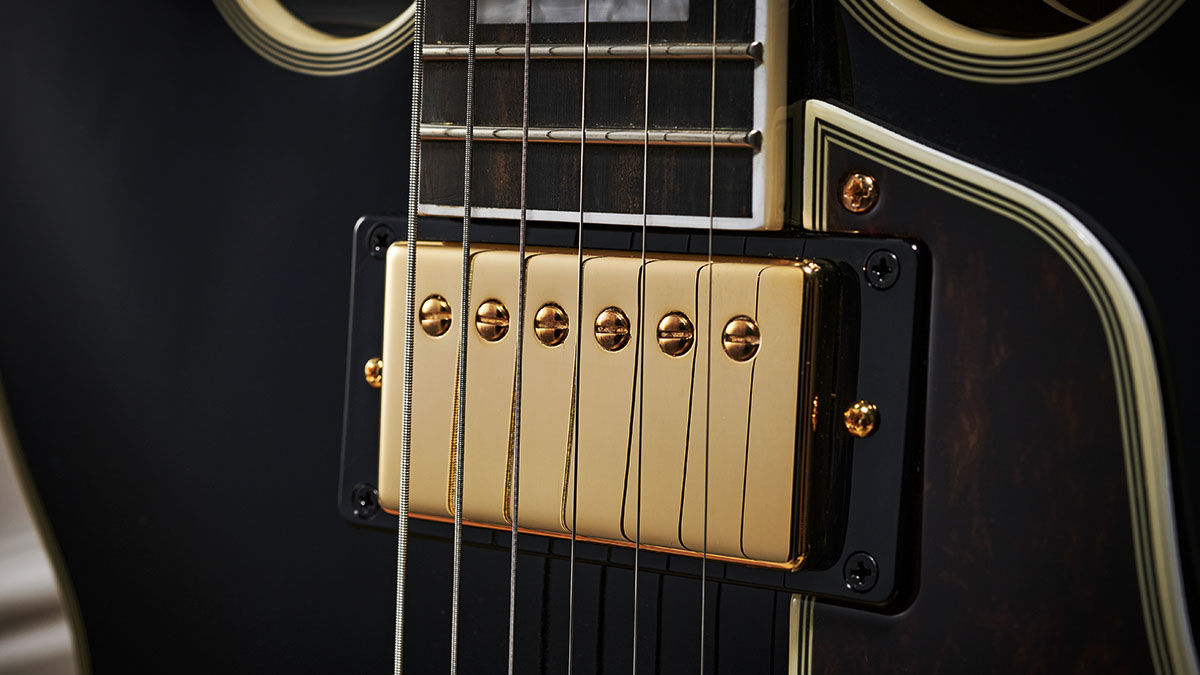
Sometimes you will hear BB King’s tone being described as sweet, and that can be the case, but sometimes that sweetness is illusory, and it’s his note choice that honeys his craft. A BB King guitar has got to give up some of that honey, but it’s got be have bite, too. It needs some teeth. The ES-355 chassis from which this Lucille spawns from certainly gives us options to move the needle tone-wise.
There are a pair of humbucking Alnico Classic Pro pickups in the neck and bridge positions, a three-way pickup selector plus a pair of volume and tone controls for each pickup. Then there’s the ace in the hole, the Varitone switch.
Want all the hottest music and gear news, reviews, deals, features and more, direct to your inbox? Sign up here.
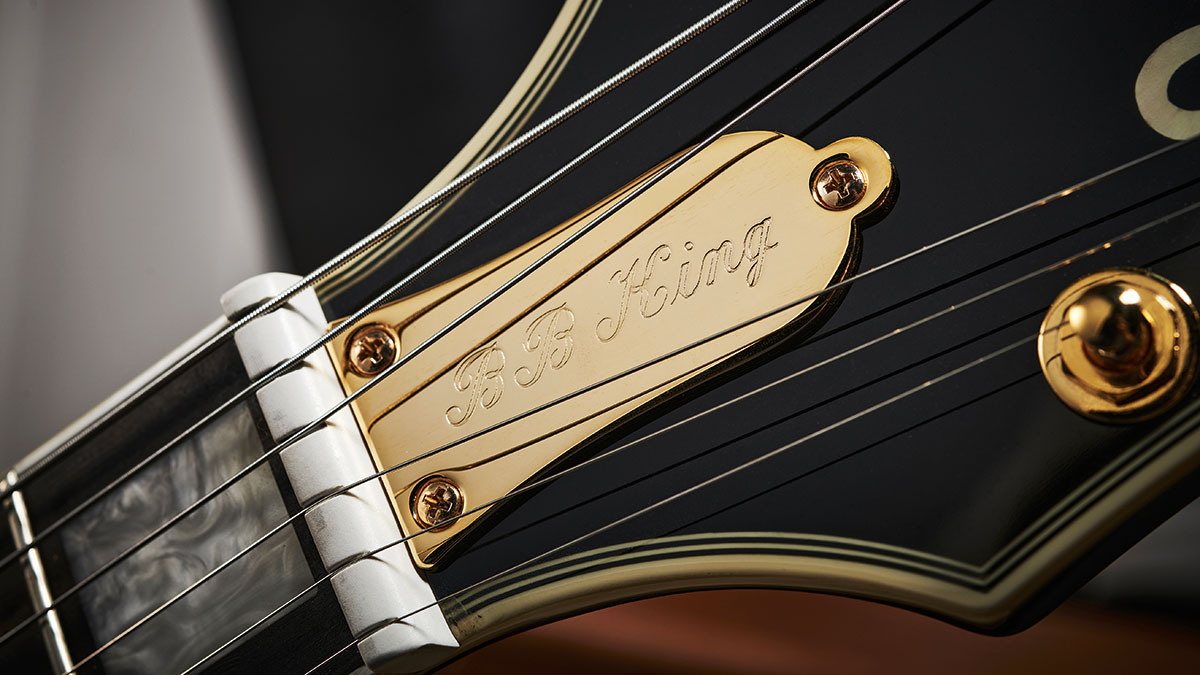
This black chickenhead dial mounted on a gold washer cycles through six positions, the first of which bypasses the Varitone, with subsequent positions applying a notch filter that take out select frequencies at each position on the dial. It was launched by Gibson in 1959. As you turn the dial, the filter’s centre frequency progresses from highs to lows, with the values of the capacitors in the Varitone determining the exact frequencies that are being filtered.
In position 1, Lucille’s electrics will perform as a regular ES-335 will. King reportedly liked to roll off some highs in positions 2 and 3. He also liked the option of running a stereo rig from his guitar, and so we have a pair of 1/4” output jacks here. Handy if you’ve got a second amp lying around and don’t want to split the signal.
Epiphone BB King Lucille: Performance and verdict
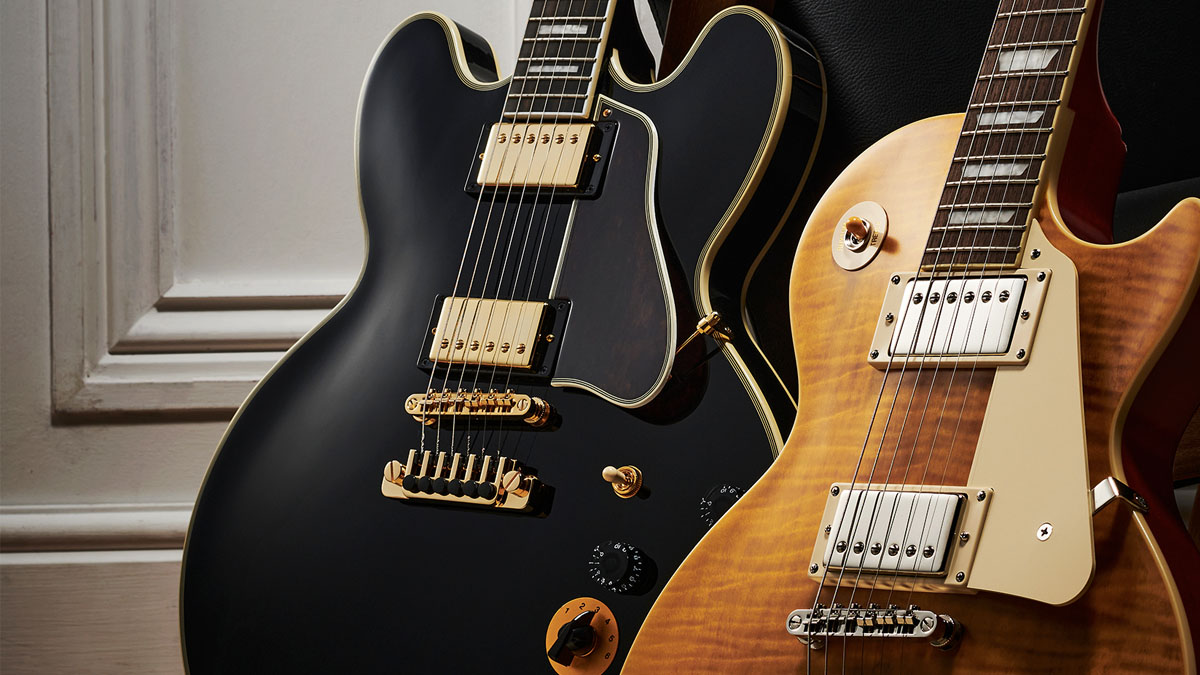
As is the norm for Epiphone these days, the factory setup is super-slinky and flattering to players of all abilities. The double-cut silhouette means you don’t have to restrict yourself to 5s, 7s and 8s on the tablature; the whole fretboard is open for business. Just remember that there’s no money about the 12th fret.
The weight might put some players off. Part of the appeal of a semi-hollow build is that what you have to contend with in bulk you don’t with regards to weight, but a thick, padded strap will take care of that, and the enduring appeal of the design soon focuses the mind on the task at hand.
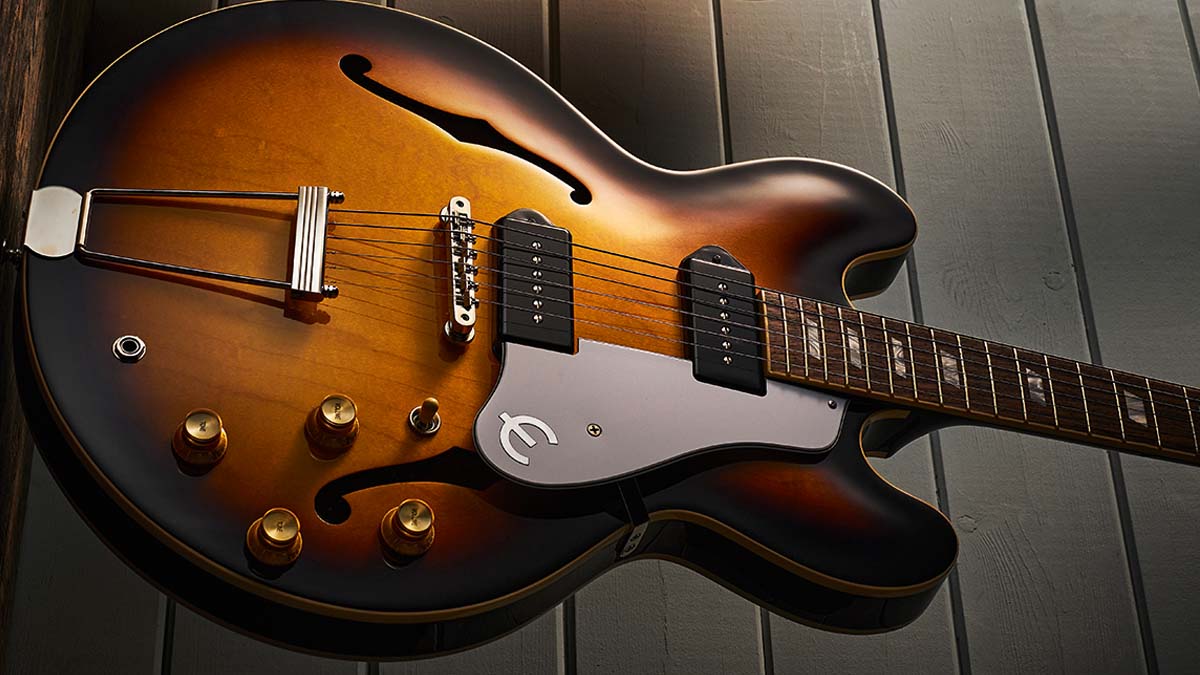
• Epiphone USA Collection E230TD Casino
The classic hollowbody electric that helped make the 60s swing remains every bit as relevant and thrilling today, with a range of superb blues, jazz and rock ’n’ roll tones, and a great neck.
• Guild S-200 T-Bird
The Dan Auerbach favourite remains an awesome choice for blues players looking for something to stamp their identity on.
• Guild Starfire I DC and Guild Starfire I SC GVT
Both make great options for blues, jazz or rock 'n' roll but there's a nice versatility to these Starfire models' voice. Allied to the cool looks and sound materials, they make for excellent value in what is a crowded market for semi-hollow electrics.
For many that is working out what that Varitone does and how it can shape the tone. But first it’s best to park it in position 1 and hear how those humbuckers measure up, and as you might expect of a set of Alnico ‘buckers on a BB King signature guitar they skew vintage in their voicing. Rock players might find them a little sedate but they all about the dynamics, with the 500K CTS pots meaning those volume and tone dials actually make a difference as you adjust them.
The sound might be warm and wide but there’s more than enough detail on them. If you can’t tease a useable blues tone out of Lucille you need to fire your guitar amp and maybe take a refresher course in blues guitar.
The Varitone complicates matters. It introduces options, some that might not be right for what you are looking for, others that could really help you find that sound and make your licks pop. There’s a nasal quality on tap if you need it, and even if you believe it to be an anachronism there will be those occasions when it works gangbusters in a mix.
The Epiphone BB King Lucille is a stately guitar. It exudes class. The list price is very accessible, sure, but this is the sort of guitar that you want to wear a tux to play, so do consider those extra dry cleaning or rental overheads. Otherwise, plugin, warm-up, and do your best to do justice to the name on the truss rod plate. He could play the blues.
MusicRadar: Epiphone’s take on the most-famous blues guitar in history puts that class and old-school suite of tones within reach of a wider demographic, and if they’ve still got the blues this is the instrument to chase them away.
Epiphone BB King Lucille: The web says
“Compared to our Les Paul, it’s more polite, perhaps a little scooped, but fat and gutsy nonetheless. BB King favoured positions 2 and 3 on the Varitone because they gave him his trademark ‘nasal’ tone, slightly compressed sounding and not miles away from Peter Green’s out-of-phase sound.”
Guitarist
Epiphone BB King Lucille: Hands-on demos
Epiphone
Guitarist
PMTVUK
Sweetwater
GuitarGuitar
Epiphone BB King Lucille: Specifications
- ORIGIN: China
- TYPE: Double-cutaway, semi-solid electric
- BODY: Laminated maple/poplar/maple without f-holes; solid maple centre block
- NECK: Maple, 59 ‘medium C’ profile, glued-in
- SCALE LENGTH: 628mm (24.75”)
- NUT/WIDTH: Tusq/43mm
- FINGERBOARD: Bound ebony, pearloid block markers, 305mm (12”) radius
- FRETS: 22, medium jumbo
- HARDWARE: Epiphone LockTone tune-o-matic bridge, TP-6 fine-tuning tailpiece, Grover Rotomatic tuners – gold-plated
- STRING SPACING, BRIDGE: 52mm
- ELECTRICS: 2x Alnico Classic Pro pickups, 3-way toggle pickup selector, 2x volumes, 2x tones, 6-way Varitone switch (CTS pots/Mallory capacitors), mono and stereo outputs
- WEIGHT (kg/lb): 4.1/9.1
- LEFT-HANDERS: No
- FINISH: Ebony, gloss
- CONTACT: Epiphone
MusicRadar is the number one website for music-makers of all kinds, be they guitarists, drummers, keyboard players, DJs or producers...
- GEAR: We help musicians find the best gear with top-ranking gear round-ups and high-quality, authoritative reviews by a wide team of highly experienced experts.
- TIPS: We also provide tuition, from bite-sized tips to advanced work-outs and guidance from recognised musicians and stars.
- STARS: We talk to musicians and stars about their creative processes, and the nuts and bolts of their gear and technique. We give fans an insight into the craft of music-making that no other music website can.
